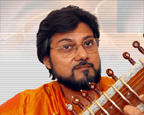An evening with Partha Bose....
 Partha Bose -> a disciple of Pandit Manoj Shankar -> a senior disciple of Ustad Bahadur Khan -> nephew and disciple of Baba Allauddin Khan, the fountainhead of the Maihar Senia Gharana enthralled an audience of around 150 with his sheer scintillating virtuousity on the sitar. This concert was organized by SPIC-MACAY TAMU. The Made in India team was fortunate to spend time with him after the concert and the interview with him proved to be a highly enriching experience for us.
Partha Bose -> a disciple of Pandit Manoj Shankar -> a senior disciple of Ustad Bahadur Khan -> nephew and disciple of Baba Allauddin Khan, the fountainhead of the Maihar Senia Gharana enthralled an audience of around 150 with his sheer scintillating virtuousity on the sitar. This concert was organized by SPIC-MACAY TAMU. The Made in India team was fortunate to spend time with him after the concert and the interview with him proved to be a highly enriching experience for us. Excerpts from the interview (Saturday Oct 22nd, 2005):
MiI: How did you like your performance today?
PB: It went off well. The audience was different. I needed to cater today to a different clientele. The choice of Raga Patadeep was deliberate. The arrangement of notes is such that it is musical even to the layman's ear. The eminent musicians who had brought Indian Classical Music to the west, esp. Ustad Ali Akbar Khan, Pandit Ravi Shankar, etc. used to choose Ragas that could be appreciated by an average western ear that has been brought up on western classical music. Patdip is an uttarang raga that is mostly played on the higher octave. This is more pleasing and exciting for the average ear. Moreover, it is an afternoon raga, and in Hindustani classical music, Ragas are played based on the time of the day. We, musicians, take these factors into account before the concert.
MiI: Are your concerts tailored towards an audience. What if a majority do not understand the technicalities of music.
PB: Such concerts are meant to be an educational learning experience for the people. We take into consideration the musical sensibilities of the audience. Some people come out of curiousity and some based on what they have listened so far. Very few can really discern the musical aspects of the recital. However, Music can touch a person through his heart. So, if a few of them were to fall in love with this system of Indian classical music, or if really serious and passionate, take it up as a hobby or a pursuit, I would consider it a job well done.
MiI: How do you visualize life as a non-musician?
PB: Now that you are asking me, that is a very deep and introspective question. I do not want to even think about it. I am from a non-musical family, and had to come up after facing a lot of family opposition. I was initiated at the age of 6 by a sheer moment of serendipity. My father was learning the sitar from my guru for 1-2 years, and my guru happened to hear me play certain notes on the piano. And the rest is a long story as to how music became very much integrated into my life.
PB: Times are changing. Nowadays, very few people are entering into this field of music. It wasn't like that then. Among my students, hardly any one is interested in pursuing music seriously. It is becoming more of a hobby and less of a vocation. I was fortunate to have been under the tutelage of Pandit Manoj Shankar. He gave me boarding and lodging for two months during difficult times. Our relationship was such that money would have vulgarised it. Often during most times, expressions of silence was the best form of expressing gratitude.
But, I am hopeful. Music is such that it touches the heart and is eternal. This form of music that we are talking of has been there for 4000 years. In the future, I see less and less of this tradition. It would not be practical for a guru have a sishya in his house during the entire period of study. I do not do the same to my students these days.
MiI: Opinion on world music experimentation.
PB: Live and Let Live would be the philosophy. I listen to western classical too (esp. Bach, Beethoven, Mozart, etc.), jazz, etc. Often, what artists claim to provide in the form of world music rarely touches the heart. However, they are becoming more popular these days. It provides a means of sustenance for the artiste. It is difficult to survive only on Classical Music.
Pictures coutesy: http://www.thesitarist.com/gallery.htm
But, I am hopeful. Music is such that it touches the heart and is eternal. This form of music that we are talking of has been there for 4000 years. In the future, I see less and less of this tradition. It would not be practical for a guru have a sishya in his house during the entire period of study. I do not do the same to my students these days.
MiI: Opinion on world music experimentation.
PB: Live and Let Live would be the philosophy. I listen to western classical too (esp. Bach, Beethoven, Mozart, etc.), jazz, etc. Often, what artists claim to provide in the form of world music rarely touches the heart. However, they are becoming more popular these days. It provides a means of sustenance for the artiste. It is difficult to survive only on Classical Music.
Pictures coutesy: http://www.thesitarist.com/gallery.htm


1 Comments:
Partha has been a near and dear childhood friend.Right from the beginning, his eye for the aesthetic beauty and grammatical precision of his music always reminded me of the famous qoute --of the renowned thinker and artiste --"Art humanises man's toil and spiritualises his feelings"
Post a Comment
<< Home